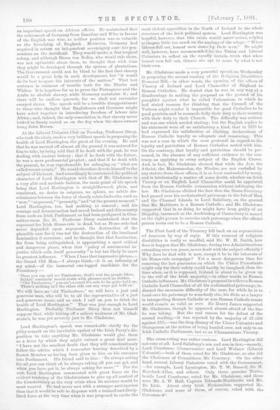The First Lord of the Treasury fell back on an
argumentulre ad korainem by way of reply. If this removal of religious. disabilities is really so needful, said Mr. W. H. Smith, how does it happen that Mr. Gladstone, during two Administrations- extending over ten years, never dealt with the subject officially ? Why does be deal with it now, except it be in the interests of his Home-rule campaign P Yet a more dangerous time for removing the last guarantee on which the Ulster Protestants- might rely for their safety could hardly be imagined, than the time when, as it is supposed, Ireland is about to be given up to the will of the Irish majority,—in other words, to Roman. Catholic influences. Mr. Gladstone's proposal to relieve a Roman Catholic Lord Chancellor of all his ecclesiastical patronage, in dieated the enormous difficulty of the case, for while he is to hand over his patronage to somebody else, his dicta as a lawyer in interpreting Roman Catholic or non-Roman Catholic trusts would remain as valid as ever. Sir Henry James supported Mr. Gladstone, though he appeared almost afraid of the line he was taking. But the real reason for the defeat of the second reading,—it was rejected by the majority of 33 (25G against 223),—was the deep dismay of the Ulster Unionists and Orangemen at the notion of being handed over, not only to am Irish Catholic Parliament, but to an Ultramontane Viceroy.










































 Previous page
Previous page